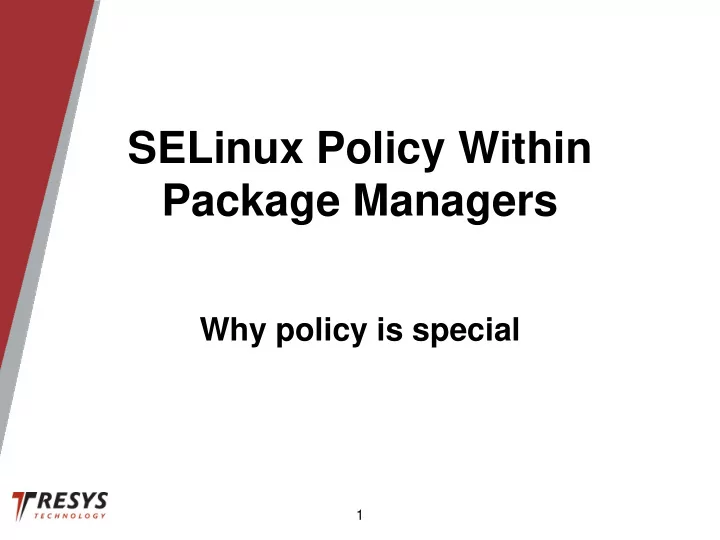

SELinux Policy Within Package Managers Why policy is special 1
SELinux? Policy? What? • SELinux is a MAC system for Linux • Enabled by default on Fedora, RHEL • Available on Ubuntu, Gentoo, Debian, etc • Policies are available for 290+ apps • Typically distributed by distro • Customized by distro’s, end users • Based on upstream Reference Policy • Currently packaged like applications 2
State of the Art • Policy distributed by distro’s • The vast majority of policy in a single package • Loading policy via post-script kludges • Failures in post-scripts have no rollback • User intervention sometimes required • On application upgrades, policy load failures • Third parties have few options • Separate packages • Combined packages with aforementioned hacks 3
State of the Art • Ordering issues very common • Security labels must be available before install • Multiple policies can take a long time to load • If they are installed from separate packages • Dependency issues • Co-dependent policies must be installed together • Numerous hacks • policy renames, moves between packages 4
Why policy is different • Potentially affects entire system • Must be installed first • before affected applications are installed • Needs to control access to data • Even after applications have been removed • (e.g., database files may contain sensitive data) • Data shared by multiple applications • Controls interaction between applications • IPC, network access, shared data 5
What we want to do • Include Policy in distro packages • Without hacks • Natively support in package manager • Install policy before affected apps • At the beginning of a transaction • All policy installed together • Be able to back out in case of failure 6
What we want to do • Gracefully support corner cases • Policy renames • Bootstrapping • Installing in clean chroot • Cross-installs • Help third parties distribute policy • Support multiple policies • For different distros, releases, policy types • Make life with SELinux easier 7
Work in Progress • Targeting RPM • Since Fedora/RHEL use SELinux by default • Already had minimal support • Hopefully more open to support • %Policy directive already present • Stores it in RPM header • Only supports one policy, no parameters • Doesn’t actually do anything with policy 8
Initial patch set • Adds policy loading support • Adds --no-policy flag • Installs all policy before %pre-trans • Aborts transaction if policy load fails • Policy install also reverted • Does not uninstall policies with app • Remaining data may be sensitive • Do not want other apps losing access 9
Second patch set • Changes to %Policy directive • Policy section in spec with key-value pairs • Policy type (MLS, strict, targeted) • Obsoletes (for policy renames) • Base policy • Still stored in header • Policy rename support • Allow policies to obsolete one another 10
New %Policy Directive %policy %module poltest-policy-%{version}/foo.pp Name: foo Types: default Obsoletes: bar baz %module poltest-policy-%{version}/bar.pp Name: bar Types: mls targeted Obsoletes: baz qux 11
Upcoming patch sets • Chroot installation • Cross-install support • Falls back to libsemanage interfaces • Bootstrap support • Package declares itself policybootstrap • If it is required for policy installation • For example, policycoreutils, libsepol • Will delay policy installation until the end • Only if packages not already present 12
Upcoming patch sets • Store policies in RPM database • Used for policy renaming • Also used for policy-type switching • If user wants to switch from targeted to MLS • RPM installs MLS policies onto system • Base module support 13
Future Work • Split out functions of a package manager • Multiple processes (and security domains) • Move vulnerable parts into more strict domains • Network-facing components • Package parsing • Isolate trusted processes from bad input • Inform admin of what an app can do • Based on the policy being installed with it 14
Future Work • Various levels of trust • Enforce restrictions on package manager • Based on who is running it • Where the package came from • Whether the package is signed • End user can specify restrictions • Only let a package install in /opt • Whether or not it can add users • How it can label its application data 15
Conclusion • Policy distribution is currently adhoc • Full of hacks, inadequacies, etc • Package managers can help • Already have transaction capabilities • Already store package metadata • Some support being sent upstream already • Lots of corner cases to cover • Eventually want to raise assurance • Allow users more control over packages 16
Recommend
More recommend